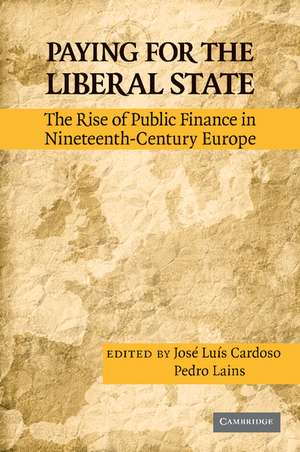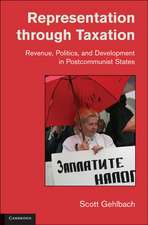Paying for the Liberal State: The Rise of Public Finance in Nineteenth-Century Europe
Editat de José Luís Cardoso, Pedro Lainsen Limba Engleză Paperback – 18 sep 2013
| Toate formatele și edițiile | Preț | Express |
|---|---|---|
| Paperback (1) | 289.01 lei 6-8 săpt. | |
| Cambridge University Press – 18 sep 2013 | 289.01 lei 6-8 săpt. | |
| Hardback (1) | 468.29 lei 6-8 săpt. | |
| Cambridge University Press – 7 feb 2010 | 468.29 lei 6-8 săpt. |
Preț: 289.01 lei
Nou
Puncte Express: 434
Preț estimativ în valută:
55.30€ • 57.89$ • 46.03£
55.30€ • 57.89$ • 46.03£
Carte tipărită la comandă
Livrare economică 31 martie-14 aprilie
Preluare comenzi: 021 569.72.76
Specificații
ISBN-13: 9781107686489
ISBN-10: 1107686482
Pagini: 326
Ilustrații: 50 b/w illus. 1 map 28 tables
Dimensiuni: 152 x 229 x 19 mm
Greutate: 0.48 kg
Editura: Cambridge University Press
Colecția Cambridge University Press
Locul publicării:New York, United States
ISBN-10: 1107686482
Pagini: 326
Ilustrații: 50 b/w illus. 1 map 28 tables
Dimensiuni: 152 x 229 x 19 mm
Greutate: 0.48 kg
Editura: Cambridge University Press
Colecția Cambridge University Press
Locul publicării:New York, United States
Cuprins
Introduction José Luís Cardoso and Pedro Lains; 1. Creating legitimacy: administering taxation in Britain, 1815–1914 Martin Daunton; 2. The development of public finance in the Netherlands, 1815–1914 Jan Luiten Van Zanden and Arthur Van Riel; 3. The apogee and fall of the French Rentier Regime, 1801–1914 Richard Bonney; 4. The evolution of public finances in nineteenth-century Germany Mark Spoerer; 5. Public finance in Austria-Hungary, 1820–1913 Michael Pammer; 6. The rise of the fiscal state in Sweden 1800–1914 Lennart Schön; 7. Always on the brink: Piedmont and Italy Giovanni Federico; 8. Public finance and the rise of the liberal state in Spain, 1808–1914 Francisco Comin; 9. Public finance in Portugal, 1796–1910 José Luís Cardoso and Pedro Lains; 10. The monetary, fiscal, and political architecture of Europe, 1815–1914 Larry Neal.
Recenzii
'Historians have long puzzled over the fact that taxes, government spending, and government debt rose as a share of the economy at the same time that institutions became more liberal in the sense of allowing, and lightly taxing, freer markets. This well-structured team study reconciles global patterns with the diversity of eight countries' individual trajectories across the long nineteenth century. Yes, successful development did follow a general evolution in fiscal structure, yet the national departures from the global path prove as instructive as the average tendency itself.' Peter H. Lindert, University of California, Davis
'A recent wave of historical literature has dealt in depth and sophistication with state formation in early modern Europe. The editors of this volume are to be warmly congratulated for recruiting such a top-class team of scholars to take that fascinating and important theme in European history forward from l815 into the twentieth century.' Patrick Karl O'Brien, FBA, London School of Economics
'How the foundations of liberal societies in Europe were established from a financial point of view is the topic of this book. In continental Europe, the transition from mercantilism to liberalism was painstaking, and failure was often more significant than success in comparison to the U.K. or U.S. experiences. Designing acceptable and enforceable rules about the distribution of the costs of the modern state was at the core of the political struggle in nineteenth-century Europe, and important lessons can be derived for present-day developing countries in which state formation is still at stake. The contributions to this well-edited volume represent the first comprehensive and successful attempt to address this important issue.' Leandro Prados de la Escosura, Universidad Carlos III, Madrid
'Paying for the Liberal State deals with the evolution of tax systems, expenditure programs, and debt regimes in Europe during the century before World War I, right on the eve of the modern welfare state. This is a wonderful collection by outstanding scholars who make this book a must-read for those who appreciate the role of political economy in driving the wealth of nations.' Jeffrey G. Williamson, Harvard University and University of Wisconsin
'A team of outstanding scholars shows how the success of the nineteenth-century European liberal state was to a considerable extent predicated on the efficiency and fairness of taxation and public expenditure. Lessons for the present abound.' Gianni Toniolo, Duke University
'A recent wave of historical literature has dealt in depth and sophistication with state formation in early modern Europe. The editors of this volume are to be warmly congratulated for recruiting such a top-class team of scholars to take that fascinating and important theme in European history forward from l815 into the twentieth century.' Patrick Karl O'Brien, FBA, London School of Economics
'How the foundations of liberal societies in Europe were established from a financial point of view is the topic of this book. In continental Europe, the transition from mercantilism to liberalism was painstaking, and failure was often more significant than success in comparison to the U.K. or U.S. experiences. Designing acceptable and enforceable rules about the distribution of the costs of the modern state was at the core of the political struggle in nineteenth-century Europe, and important lessons can be derived for present-day developing countries in which state formation is still at stake. The contributions to this well-edited volume represent the first comprehensive and successful attempt to address this important issue.' Leandro Prados de la Escosura, Universidad Carlos III, Madrid
'Paying for the Liberal State deals with the evolution of tax systems, expenditure programs, and debt regimes in Europe during the century before World War I, right on the eve of the modern welfare state. This is a wonderful collection by outstanding scholars who make this book a must-read for those who appreciate the role of political economy in driving the wealth of nations.' Jeffrey G. Williamson, Harvard University and University of Wisconsin
'A team of outstanding scholars shows how the success of the nineteenth-century European liberal state was to a considerable extent predicated on the efficiency and fairness of taxation and public expenditure. Lessons for the present abound.' Gianni Toniolo, Duke University
Descriere
Covers the development of taxation systems, expenditure programs, and debt regimes in Europe from the early nineteenth century to the beginning of World War I.














